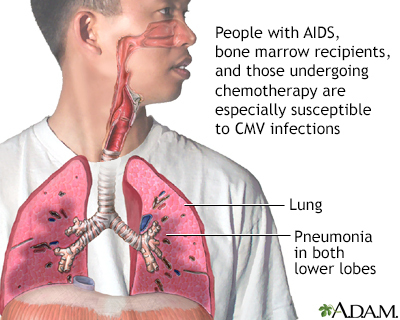CMV pneumonia
Definition
Cytomegalovirus (CMV) pneumonia is a viral infection of the lungs that can occur in people who have a suppressed immune system.
Alternative Names
Pneumonia - cytomegalovirus; Cytomegalovirus pneumonia; Viral pneumonia
Causes
CMV pneumonia is caused by a member of a group of herpes-type viruses. Infection with CMV is very common. Most people are exposed to CMV in their lifetime, but typically only those with weakened immune systems become ill from CMV infection.
Serious CMV infections can occur in people with weakened immune systems as a result of:
- HIV/AIDS
- Bone marrow transplant
- Chemotherapy or other treatments that suppress the immune system
- Organ transplant (especially lung transplant)
In people who have had organ and bone marrow transplants, the risk for infection is greatest 5 to 13 weeks after the transplant.
Symptoms
In otherwise healthy people, CMV usually produces no symptoms, or it produces a temporary mononucleosis-type illness. However, those with a weakened immune system can develop serious symptoms. Symptoms may include:
Exams and Tests
The health care provider will perform a physical exam. In addition, the following tests may be done:
- Venous and/or arterial blood gas
- Oximetry
- Blood culture
- Blood tests to detect and measure substances specific to CMV infection
- Bronchoscopy (may include biopsy)
- Chest x-ray
- CT scan of chest
- Urine culture (clean catch)
- Sputum gram stain and culture
Treatment
The goal of treatment is to use antiviral drugs to stop the virus from copying itself in the body. Some people with CMV pneumonia need IV (intravenous) medicines. Some people may need oxygen therapy and breathing support with a ventilator to maintain oxygen until the infection is brought under control.
Outlook (Prognosis)
Antiviral drugs stop the virus from copying itself, but do not destroy it. The CMV suppresses the immune system, and may increase your risk for other infections.
Low oxygen level in the blood of people with CMV pneumonia often predicts death, especially in those who need to be placed on a breathing machine.
Possible Complications
Complications of CMV infection in people with HIV/AIDS include spread of disease to other parts of the body, such as the esophagus, intestine, or eye.
Complications of CMV pneumonia include:
- Kidney impairment (from drugs used to treat the condition)
- Low white blood cell count (from drugs used to treat the condition)
- Overwhelming infection that doesn't respond to treatment
- Resistance of CMV to standard treatment
When to Contact a Medical Professional
Contact your provider if you have symptoms of CMV pneumonia.
Prevention
The following have been shown to help prevent CMV pneumonia in certain people:
- Using organ transplant donors who don't have CMV
- Using CMV-negative blood products for transfusion
- Using CMV-immune globulin in certain people
Preventing HIV/AIDS avoids certain other diseases, including CMV, that can occur in people who have a weakened immune system.
Gallery


References
Britt WJ. Cytomegalovirus. In: Bennett JE, Dolin R, Blaser MJ, eds. Mandell, Douglas, and Bennett's Principles and Practice of Infectious Diseases. 9th ed. Philadelphia, PA: Elsevier; 2020:chap 137.
Crothers K, Worodria W, Huang L. Pulmonary complications of HIV infection. In: Broaddus VC, Ernst JD, King TE, et al, eds. Murray and Nadel's Textbook of Respiratory Medicine. 7th ed. Philadelphia, PA: Elsevier; 2022:chap 123.
Singh N, Haidar G, Limay AP. Infections in solid-organ transplant recipients. In: Bennett JE, Dolin R, Blaser MJ, eds. Mandell, Douglas, and Bennetts Principles and Practice of Infectious Diseases. 9th ed. Philadelphia, PA: Elsevier; 2020:chap 308.